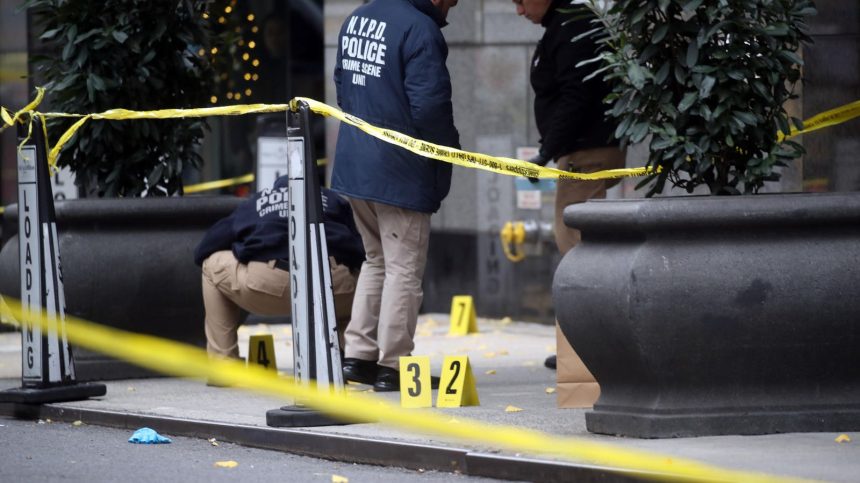The assassination of Brian Thompson, CEO of UnitedHealthcare, has sent shockwaves through the corporate world and the healthcare industry. Thompson, 50, was fatally shot on Wednesday morning in New York City, just moments before he was scheduled to address an investor meeting for UnitedHealth Group, the parent company of UnitedHealthcare. The incident, described by police as a “brazen targeted attack,” occurred outside the New York Hilton Midtown where the meeting was to take place. While official details remain limited, the chilling discovery of words etched onto the shell casings found at the scene has fueled speculation and intensified scrutiny of the healthcare insurance industry.
Initial reports suggested the words “deny,” “defend,” and “depose” were inscribed on the casings. These terms resonate with a common critique of insurance practices, often summarized as “delay, deny, defend.” Critics of the industry argue that these tactics are employed to avoid or minimize claim payouts, forcing claimants into protracted and costly legal battles. This strategy, detailed in Jay Feinman’s book “Delay Deny Defend: Why Insurance Companies Don’t Pay Claims and What You Can Do About It,” alleges that maximizing profits, even at the expense of valid claims, has become a systemic issue within the industry. Given UnitedHealthcare’s position as one of the nation’s largest health insurers and a frequent target of such criticism, the presence of these words on the shell casings immediately raised questions about a potential connection to Thompson’s professional life.
However, subsequent reports from The New York Times indicated that the words found on the casings were “delay” and “deny,” not “deny,” “defend” and “depose” as initially reported. While this discrepancy slightly alters the direct connection to the industry criticism, the presence of “delay” and “deny” still alludes to the controversial practices that have drawn public ire and legal challenges. Regardless of the exact wording, the inscription of any terms related to insurance claim disputes on the shell casings undeniably injects a layer of intrigue into the investigation. This chilling detail, combined with reports of threats received by Thompson prior to the shooting, paints a picture of a potentially premeditated attack with motives possibly linked to his role within the healthcare industry.
The search for Thompson’s killer continues, with law enforcement offering a $10,000 reward for information leading to an arrest. Surveillance footage has been released, offering glimpses of the suspected assailant. While investigators have explored several leads, the suspect’s identity remains unknown, adding to the urgency and complexity of the case. The brazen nature of the attack, carried out in broad daylight in a bustling city, underscores the boldness and apparent premeditation of the act. The suspect, according to police, lay in wait for Thompson, suggesting a targeted operation rather than a random act of violence.
This tragic incident has also brought renewed attention to the broader issues of healthcare affordability and accessibility in the United States. Recent studies indicate a decline in the number of Americans who feel they can access and afford quality healthcare. The West Health and Gallup healthcare affordability index reveals a concerning trend, with only 55% of American adults reporting access to affordable care, the lowest figure since tracking began in 2021. This statistic underscores the ongoing challenges faced by many Americans in navigating the complexities and costs of the healthcare system, a system within which UnitedHealthcare plays a significant role.
The investigation into Thompson’s death continues, leaving many questions unanswered. Did the words on the shell casings represent a symbolic message? Was the attack directly motivated by Thompson’s position within UnitedHealthcare? As investigators pursue leads and analyze evidence, the nation watches, grappling with the implications of this brazen act of violence against a prominent figure in the healthcare industry. The answers, when they come, will undoubtedly shed light on the motivations behind this tragic event and potentially expose deeper issues within the healthcare system itself. The assassination of Brian Thompson serves as a stark reminder of the complex and often contentious landscape of healthcare in America, where financial pressures, accessibility challenges, and industry practices intersect with tragic consequences.



